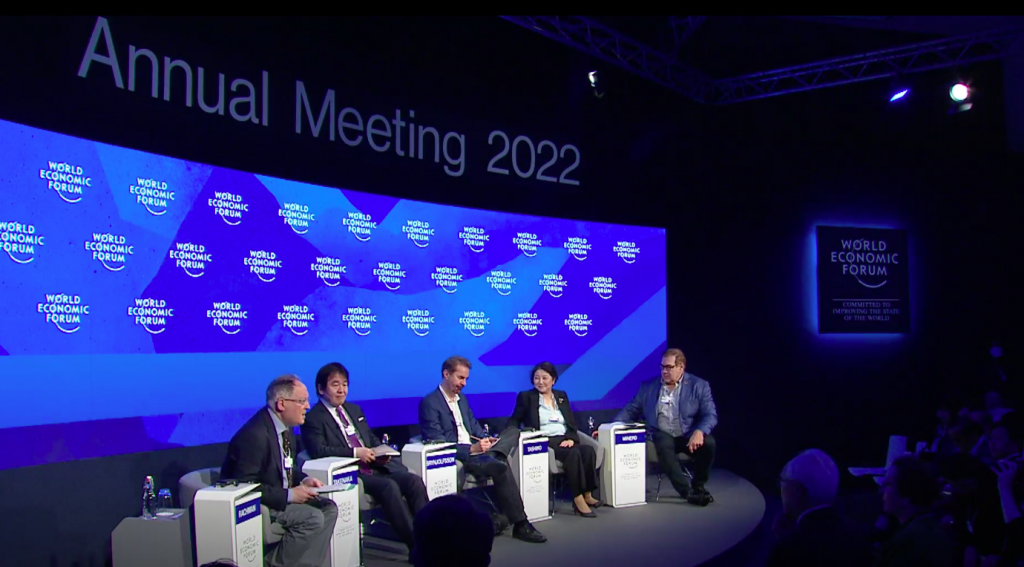
- ARAB NEWS
- 12 Jul 2025

Arab News Japan
DUBAI: The prevailing approach of the modern global economy has produced large and growing disparities. Consequently, the Japanese government is pursuing policies to reform and reinvigorate its economy under an approach referred to as a “new form of capitalism.”
“It is very difficult to predict the real core of the ‘New Capitalism’ in Japan but while the Japanese economy is relatively stable, there are several areas that need to be addressed and strengthened, such as government roles and income redistribution,” Heizo Takenaka, professor emeritus at Keio University, told a panel at the World Economic Forum on Wednesday.
“While it is stable, there are still problems such as the rising inflation rate and the depreciation of the yen. A year ago $1 was 110 yen while now it is 130 yen, which means there has been a 20 percent decline. The real, effective exchange rate is the lowest in the past 50 years. This reflects that Japan has not realized its potential yet and active reform is needed.”
Japan has a complicated relationship with China, which is both its biggest export market and its biggest source of imports. The Japanese government wants to bring some manufacturing back to the country, panelists said, despite the deep supply chains that Japanese companies have built in China, which have added to Japan’s wealth.
“I think even before what is happening now, we have been discussing bringing more manufacturing to Japan,” said Keiko Tashiro, the deputy president and CEO of Daiwa Securities Group. “I think it is a trend that has been considered and will continue.
“Remanufacturing is something that companies are actually considering, not because we are losing jobs but more because of the growth and potential they offer by bringing them back.”
Despite the growing concerns about doing business in China and the tensions between the two countries, Japanese companies have not neglected the importance of their economic and trade relations with China.
Additionally, Tashiro noted that the pledges made by both Japan and China to tackle climate change by reducing carbon emissions to net-zero will require a collaborative effort, given that the latter has a notable lead in solar energy production and storage.
“We have a joint venture in China that started in June and obviously we’re very concerned about the direction that we want to go,” she said. “On the other hand, where we can work together, such as net-zero, which everyone has to do, we need to get China involved.
“As an international community I think it is very difficult to ignore what China can contribute to 2050 net-zero,” she added, referring to the target date adopted by many nations to achieve net-zero emissions.
Commenting on the geopolitics of the region and the possibility of an economic “decoupling” of Japan and China, given the encouragement for remanufacturing in the former, Takenaka said: “No one prefers decoupling and globalization should continue, but at the same time some robustness is needed for the economy.
“Economic security is important but having restrictions on globalization that are too strict will have a cost and reduce living standards. So we have to be very careful about the balance between free-trade and economic security.”
Another important pillar for Japan’s transformation that panelists discussed is technological progress and the challenges associated with the country’s shrinking pool of labor.
Takenaka explained that the pace of advances in technology has increased and the use of artificial intelligence has accelerated in several industries.
“Toyota has been making use of its many robots since the 1980s and even gave a name to each robot and dealt with them as humans,” he said. “In that sense, I think there are a lot of possibilities.”
While current advances in robotics and other digital technologies tend to cause anxiety among workers in most countries because of the anticipated loss of jobs, experts said the labor force in Japan views such advancements as an essential aspect of economic growth.
“One of the things that made robots successful in Toyota was the relationship between employers and employees there,” said Erik Brynjolfsson, the Jerry Yang and Akiko Yamazaki professor and senior fellow at the Stanford Institute for Human-Centered AI and director of the Stanford Digital Economy Lab, as he highlighted the important role of IT and technology in Japan.
“In the United States, GM (General Motors) used a lot of robots and used it to lay off a lot of people, so immediately the workers saw the machines as a threat. In Japan, there is more of a lifetime-employment culture, so the employees didn’t see them as a threat but rather something that could help make their work easier and work together, so it’s a different mindset.”
When asked about the role that younger generations can play in helping to ensure the restoration and enhancement of economic growth in the country, Tashiro said Japan needs to increase its investment in people through the creation of a more diverse and inclusive society.
“I think the most important thing we can do is not be afraid of change,” she said. “Our generation and older generations in Japan can’t change. For inclusion and diversity, we are getting nowhere and that is the problem that we have.”
She added that women need to be on a more equal footing in terms of employment: “The reason they are trying to get them into the workforce is due to their labor and the falling population and not because they have diverse ideas and I have a big problem with that, which is underlying everything we have been talking about, such as investment and innovation.”